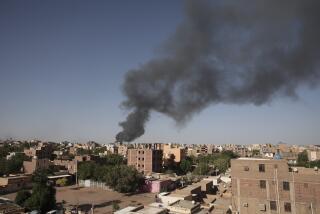U.S. Officials Plan Offensive Against Anti-Americanism in Kenyan Media
- Share via
NAIROBI, Kenya — A growing anti-American sentiment in the Kenyan press has begun to worry U.S. officials, who say they will take steps to counter it.
Daily newspapers here have begun to accuse Americans of rejecting the help of Kenyan volunteers and attending to their own wounded at the expense of Kenyans after last week’s devastating bomb blast at the U.S. Embassy.
Local media have also lambasted Washington for issuing an advisory urging U.S. citizens to stay away from this East African nation.
Although the anti-American mood does not appear to be widespread among average Kenyans, U.S. officials worry about its effect on opinion-makers.
U.S. officials, visibly rattled by the negative press, said Tuesday that they were working to set the record straight regarding the work of American military, medical and rescue workers in recovering bodies.
The bombing in Nairobi and another in Dar es Salaam, the capital of neighboring Tanzania, claimed at least 228 lives, among them 12 Americans, and injured more than 4,000 people.
Some Kenyans feel that U.S. Marines, soon after the blast, were too zealous in preventing local rescue workers from coming near the embassy and even ignored cries for help from those trapped and injured in the compound.
“The Kenyans were treated by the U.S. Marines as though they were the enemy,” the Kenya Times, a daily and a mouthpiece for the government, said Tuesday in a scathing editorial. “Heavily armed soldiers, many more than the embassy had ever put on display around the building, pointed their deadly guns at the Good Samaritans and ordered them to back off, despite the fact that Kenyans in the wrecked American Embassy building were crying out to someone, anyone out there to save their lives.”
Rescue workers acknowledge that more lives could have been saved in the first 24 hours after the blast if there had been more medical personnel and better technical equipment available on-scene.
“The Marines were very hostile,” said John Githongo, a respected political columnist who also heads the Nairobi-based African Strategic Research Institute, a local think tank; he was on the scene shortly after the blast. “There is a feeling among many that if the Americans were more open, more lives would have been saved.”
A U.S. official acknowledged that the Americans were accused of being “selfish,” and of not helping Kenyans in the beginning. “The fact is, we were trying to help our families first . . . and we were helping Kenyans,” the official said. “A Marine’s job is to protect the embassy, and not let anybody in. We appreciate the desire to help, but . . . who knows, there could have been a second explosion.”
The official acknowledged that efforts were being made to defuse any misunderstanding that might lead to a backlash against Americans. A press statement was circulated Tuesday outlining how the U.S. has assisted Kenya since the Friday bombing, detailing even the amounts of equipment.
U.S. officials also called editors of the leading Kenyan papers to “talk about their perspective and respond to their concerns,” a U.S. official said.
Still, some here believe that the damage has already been done and that Kenyans now perceive Americans differently. “There are certain impressions that are being formed by people who observed the way Americans behaved in the initial hours, which was not necessarily positive,” said Tom Mshindi, managing editor of the Daily Nation. “It reinforces a stereotype that there is an exaggerated sense of selfishness among Americans.”
Mshindi’s paper also criticized the State Department advisory, issued Sunday, urging Americans to reconsider visiting Kenya, as there will no longer be consular services in Nairobi to assist U.S. travelers. Many Kenyans said they feared the warning will ruin tourism and frighten off investors.
But U.S. officials here offered no apologies. “There’s no way we were not going to put out an advisory when a bomb destroys the American Embassy,” said one diplomat. “To expect otherwise is just not realistic.”
More to Read
Sign up for Essential California
The most important California stories and recommendations in your inbox every morning.
You may occasionally receive promotional content from the Los Angeles Times.














